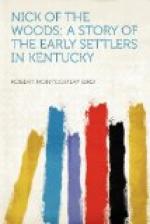“Had there been twenty of the villains, and you had killed them all, I should have held it the noblest and most virtuous act you could have performed,” said Roland, too fiercely agitated by his own contending passions to note the strange medley of self-accusing and exculpatory expressions, the shame-faced, conscience-stricken looks, alternating with gleams of military fire and self-complacency, with which the man of peace recounted his bloody exploit, or the adroit attempt, with which he concluded it, to shuffle the responsibility of the crime, if crime it were, from his own to the young Virginian’s shoulders. At another moment, the latter might have speculated with as much surprise as approval on the extraordinary metamorphosis of Nathan, the man of amity and good will, into a slayer of Indians, double-dyed in gore; but at that juncture, he had little inclination to dwell on anything save his own liberation and the hapless fate of his cousin.
CHAPTER XXIII.
By dint of chafing and bathing in the spring, still foul and red with the blood of the Piankeshaws, the limbs of the soldier soon recovered their strength, and he was able to rise, to survey the scene of his late sufferings and liberation, and again recur to the harassing subject of his kinswoman’s fate. Again he beset Nathan with questions, which soon recalled the disturbed looks which his deliverer had worn when first assailed with interrogatories. He adjured him to complete the good work he had so bravely begun, by leaving himself to his fate, and making his way to the emigrants, or to the nearest inhabited Station, whence assistance might be procured to pursue the savages and their captives, before it might be too late. “Lead the party first to the battleground,” he said: “I am now as a child in strength, but I can crawl thither to meet you; and once on a horse again, be assured no one shall pursue better or faster than I.”
“If thee thinks of rescuing the maiden,” said Nathan—
“I will do so, or die,” exclaimed Roland, impetuously; “and would to Heaven I could die twice over, so I might snatch her from the murdering monsters. Alas! had you but followed them, instead of these three curs; and done that service to Edith you have done to me!”
“Truly,” said Nathan, “thee talks as if ten men were as easily knocked on the head as ten rabbits. But, hearken, friend, and do thee have patience for a while! There is a thing in this matter that perplexes me; and, verily, there is two or three. Why did thee desert the ruin? and who was it led thee through the canes? Let me know what it was that happened thee; for, of a truth, there is more in this same matter than thee thinks.”




